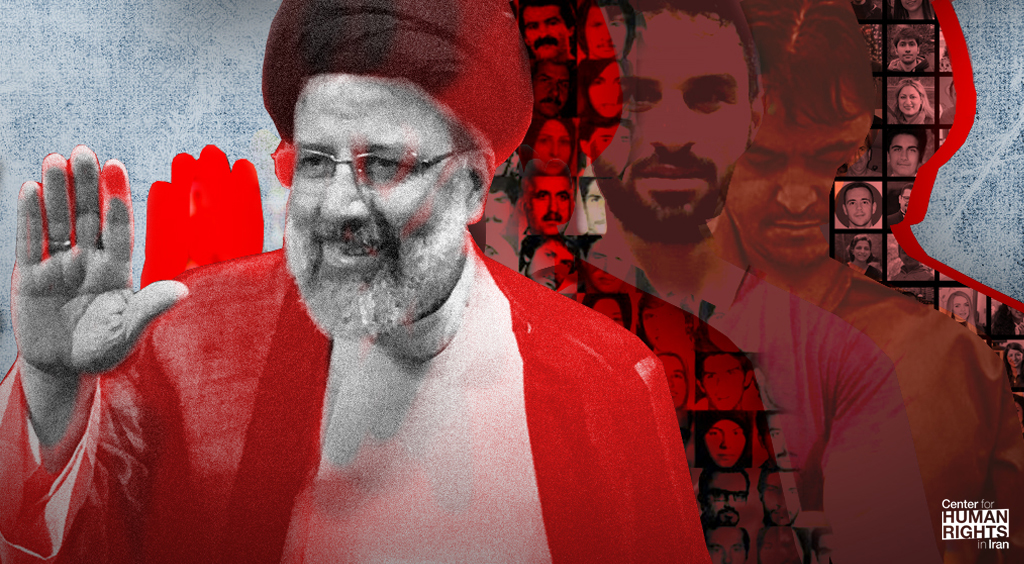Iran Election: Don’t Ignore Ebrahim Raisi’s Gross Rights Violations
 Judiciary Chief’s Presidential Bid Reignites Calls for Accountability
Judiciary Chief’s Presidential Bid Reignites Calls for Accountability
June 3, 2021 – Iranian presidential candidate Ebrahim Raisi should be investigated for crimes against humanity, the Center for Human Rights in Iran (CHRI) said in a statement today.
“Raisi is a pillar of a system that jails, tortures, and kills people for daring to criticize state policies,” said CHRI Executive Director Hadi Ghaemi.
“Instead of running for president, he should be tried in an impartial court and held accountable for his role in the extrajudicial executions of thousands of prisoners,” Ghaemi added.
Appointed as judiciary chief by Supreme Leader Ali Khamenei in March 2019, Raisi has played key roles in the politically motivated executions and unjust imprisonments of countless Iranians over the last three decades.
In 1988, Raisi was appointed to a four-man “death committee” by then-Supreme Leader Ruhollah Khomeini, which paved the way for at least 4,500-5,000 prisoners to be executed and buried in unmarked mass and individual graves, based on the committee’s determination of their “loyalty” to the newly established Islamic Republic. These prisoners had already been tried and were serving their issued prison sentences.
At that time, Grand Ayatollah Hossein Ali Montazeri, who was briefly the heir-apparent to the supreme leader, condemned the killings, saying in an audio recording: “I believe this is the greatest crime committed in the Islamic Republic since the [1979] revolution and history will condemn us for it…. History will write you down as criminals.”
No one in Iran has ever been held accountable for the killings. Instead, state agents have harassed and threatened victims’ relatives for demanding investigations and trying to locate their loved ones’ remains, while the death committee members were appointed to various high-level government positions in the ensuing years.
UN human rights experts’ call for accountability regarding the 1988 mass executions was communicated to the Iranian government in September 2020.
“We are concerned the situation may amount to crimes against humanity,” said the UN experts, adding that if the Iranian government continued to refuse to investigate those responsible, the international community should “establish an international investigation.”
No Justice Under Judiciary Chief Raisi
Raisi’s first two years as judiciary chief (2019-2021) have been marked by intensified repression and rights violations, including:
Executions
- Iran is second only to China in absolute numbers of reported executions worldwide and was responsible for more than half in the Middle East and North Africa region.
- Iran remains among a small minority of countries that impose the death penalty against juvenile offenders.
- Protesters and dissidents were executed, including dissident Ruhollah Zam, who was abducted from Iraq.
- Non-Persian ethnic Iranians including Arab, Baluch, and Kurdish political prisoners continued to be disproportionally executed.
- For the first time in the past two decades, a man was executed for alcohol consumption.
- Executions continue to be routinely carried out after prosecutions lacking due process and trials that do not conform to international fair trial standards.
Persecution of Religious Minorities
- Christian converts and Baha’i faith members continued to be arrested and sentenced to prison for their beliefs.
- Baha’is continued to be denied access to higher education.
Lack of Accountability
- State security forces killed at least 300 protesters and bystanders during mass street demonstrations in November 2019 with impunity.
- No high-level official has been held accountable for the Revolutionary Guards’ downing of a passenger plane, which killed 176 people.
- Interrogators continued to abuse prisoners with impunity, including through torture, denial of medical treatment, and the forced extraction of false “confessions.”
Mistreatment of Political Prisoners
- People continued to be tried for peaceful activism, and political prisoners, particularly women, were subjected to harsher treatment including:
- Physical and psychological torture
- Prolonged solitary confinement
- Forced confessions
- Denial of medical treatment
- Unlawful transfers to prisons far from their families
Assault on Independent Defense Lawyers
- Human rights-focused defense attorneys continued to be jailed and impeded from doing their jobs.
- At least four human rights lawyers remained imprisoned.
- New regulations were imposed to undermine the independence of the Iranian Bar Association.
Detainment of Dual Nationals as Political Pawns
- The long-held state policy of detaining dual and foreign nationals continued, with at least 15 dual nationals and one foreign national detained without due process as of June 2021, including at least five elderly people with serious health conditions.
Prior to his appointment as judiciary chief, Raisi, 60, held top judicial positions in Iran, including Tehran prosecutor and chief prosecutor for the clergy, and he also was a member of the Assembly of Experts and the Expediency Council.
Supreme Leader Khamenei also appointed Raisi in 2016 as custodian of the Astan Quds Razavi religious institution, the country’s wealthiest charitable institution that is not required to disclose its financials and is run by officials and clerics that report only to the supreme leader.
The fact that Raisi was essentially hand-picked while almost all other candidates were disqualified reveals the boundless impunity of Iran’s political establishment and its shameful exaltation of egregious rights violators.
“This is not an election, it’s a selection and appointment,” said Ghaemi.
“Raisi has risen to the top of Iran’s leadership by continuing the state’s systematic rights violations with impunity,” he added. “Yet no title can absolve him of his crimes.”






